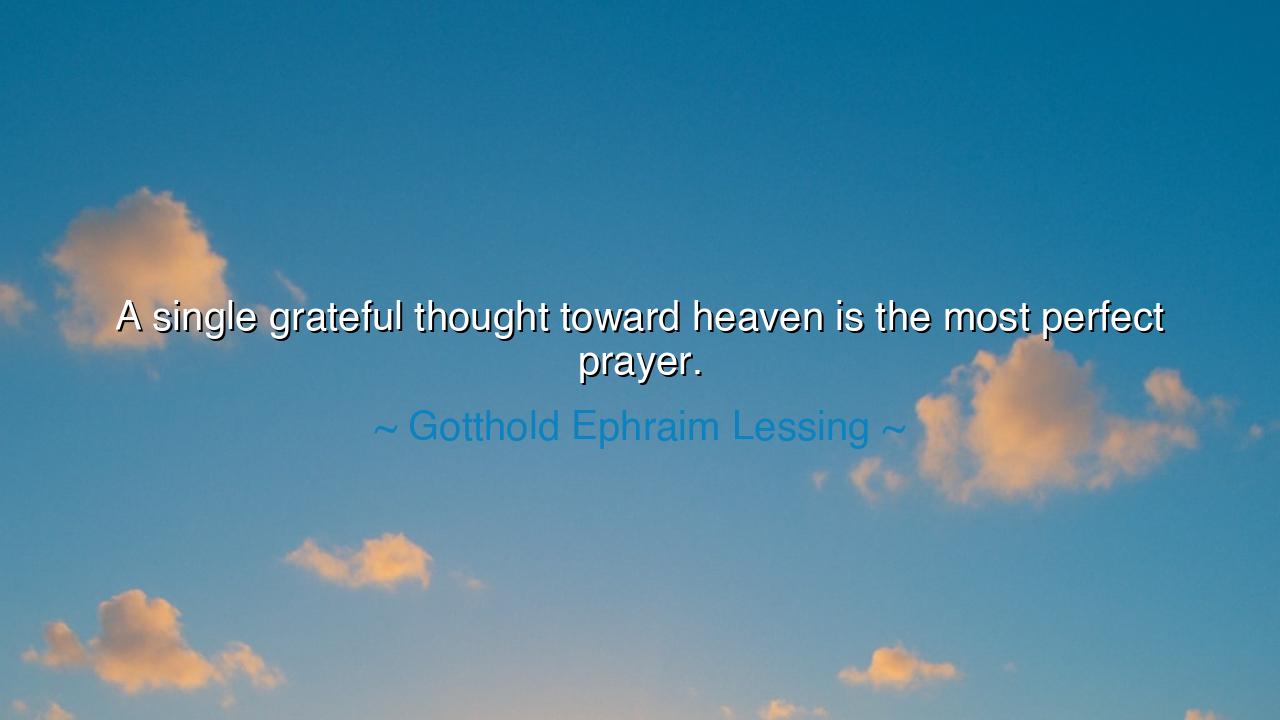
A single grateful thought toward heaven is the most perfect






The German sage, Gotthold Ephraim Lessing, left us this jewel of wisdom: “A single grateful thought toward heaven is the most perfect prayer.” In these few words, he unveils a truth more profound than endless sermons. The heart of true prayer is not found in eloquence, nor in long recitations, nor in ritual repeated without feeling. It is found in gratitude, pure and unadorned, rising from the depths of the soul to its Maker. A single moment of thankful remembrance outweighs hours of empty words, for it springs not from the lips but from the heart.
To lift a grateful thought is to acknowledge that life itself is gift. It is to see with clear eyes that each breath, each dawn, each kindness, is undeserved mercy. Such recognition humbles the spirit, breaking the chains of pride and complaint. Lessing calls this the most perfect prayer because gratitude unites man and God more swiftly than any petition. In thankfulness, we stop striving, stop demanding, and simply behold the goodness that already surrounds us. In that moment, we draw near to the Divine, not as beggars clamoring for alms, but as children rejoicing in their Father’s love.
The ancients knew this well. The Psalmist cried, “Enter His gates with thanksgiving,” teaching that gratitude is the doorway to the sacred. The Stoics, too, spoke of daily remembering what fortune has bestowed, finding peace in acceptance rather than complaint. Across faiths and philosophies, the song is the same: gratitude is the highest form of worship, for it lifts the heart beyond self toward heaven.
Consider the story of Corrie ten Boom, a woman imprisoned in a Nazi concentration camp. Surrounded by suffering, she chose to give thanks even for the lice in her barracks, for they kept the guards away and allowed secret prayer meetings to flourish. That single grateful thought, born in darkness, was her most perfect prayer. It did not change her chains, but it transformed her spirit, filling her with strength and light that carried her through unspeakable trials. Her gratitude, offered to heaven, became a flame that warmed countless souls in the coldest of places.
Lessing’s words also challenge us to strip away our illusions about prayer. Too often, prayer is weighed down with endless petitions—lists of what we desire, what we fear, what we lack. But gratitude is simpler and greater. A single whispered “thank You” sanctifies the moment. A glance at the stars with awe, a sigh of relief after hardship, a thought of joy for the presence of a loved one—these are perfect prayers, for they turn the soul heavenward with no adornment but sincerity.
The lesson, then, is clear: if you wish to draw close to heaven, begin not with demands but with thanks. Practice the art of pausing each day to lift one grateful thought. It may be for something vast, like the gift of life, or something small, like the smile of a child or the taste of bread. Whatever it is, let that gratitude rise silently, for heaven hears such prayer more clearly than a thousand empty petitions.
Practically, let us cultivate this practice: upon waking, let the first thought be one of thanks for breath and dawn. In moments of hardship, search for even the smallest mercy, and lift it upward. Before sleep, remember one blessing from the day, and let it be your final prayer. In doing so, we align our hearts with the eternal rhythm of grace, living not as complainers but as those who see life as holy gift.
Thus, Lessing’s wisdom endures across the centuries. Gratitude is the golden key, the highest language, the truest prayer. For when the heart whispers thanks, heaven bends near. And in that sacred exchange, we discover the deepest truth of all—that to be thankful is already to be in communion with the Divine. A single grateful thought is enough.






AAdministratorAdministrator
Welcome, honored guests. Please leave a comment, we will respond soon